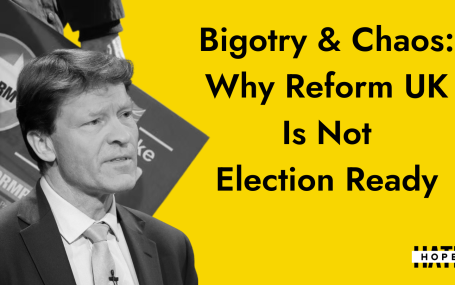HOPE not hate uses cookies to collect information and give you a more personalised experience on our site. You can find more information in our privacy policy. To agree to this, please click accept.
After being served papers on 3 March, Stephen Yaxley-Lennon (‘Tommy Robinson’) has 14 days to respond to a case brought against him by a 16-year-old Syrian refugee who can only be identified as “Jamal”. In October 2018 a video was widely-shared showing the boy being knocked to the ground at his Huddersfield school before having water poured on his face.
Lennon claimed on his social media accounts after the incident that Jamal had been “violently attacking” young girls, though the mother of the pupil Lennon referred to stated that the boy was not involved in the assault. Lennon also claimed that “lots of Muslim gangs are beating up white English kids [in Britain]”.
Solicitor Tasnime Akunjee, who is representing Jamal and his family, has stated that due to “Lennon’s false remarks and their wide online circulation, Jamal became the focus of countless messages of hate and threats from the extreme rightwing”.
Akunjee added: “The police informed Jamal that there was an increased risk to the safety of he and his family; as a result, he and his family were forced to relocate.”
Akunjee has also highlighted the irresponsibility of Facebook in this incident, telling The Guardian: “Our submission is that Mr Robinson, in tandem with Facebook, engaged in defamation of our client and these the claims were repeated numerous times across the world.”
Pressure on social media
Akunjee’s statement highlights the growing pressure on social media companies to take greater action against propagators of hate.
On 26 February Lennon was dealt a major blow in this regard, after his private and public Facebook accounts, as well as his Instagram account, were deleted.
In a statement, Facebook said that Lennon had repeatedly broken its standards on the basis of “posting material that uses dehumanizing language and calls for violence targeted at Muslims,” as well as “behav[ing] in ways that violate our policies around organized hate”.
HOPE not hate has long campaigned against Lennon and welcomes this decision. As our chief executive, Nick Lowles, explained in HuffPost following the ban, not only will this have an impact on Lennon’s ability to spread hate, it will also affect his ability to fund his activities.
To put this in context, Lennon’s Facebook page had 1,080,000 followers and 996,300 likes, his posts regularly hit more than 10,000 shares, and on one occasion he managed to collect as much as £100,000 through the site’s charity donation tool.
Worryingly, Lennon saw considerable growth and international support in 2018. Yet now that he faces this new legal action, as well as increased pressure on tech on social media companies not to capitulate to the spreading of his hatred, the tide could be beginning to turn.

HOPE not hate reveals ANOTHER shameful Reform UK candidate – and lifts the lid on the party’s chaotic selection process UPDATE: Reform UK has DROPPED…